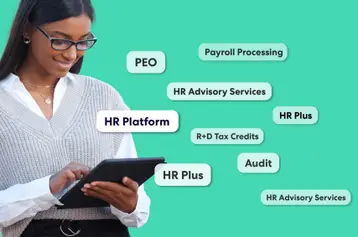11 Questions to Ask Before Choosing a PEO

Table of contents
- 1.Benefits of Working with a PEO
- 2.Important Questions to Ask Before Choosing a PEO
- 3.What will I be paying for?
- 4.How much does working with a PEO cost?
- 5.What services are included?
- 6.What kind of technology or software does your firm provide?
- 7.Do you provide training or professional development?
- 8.Do you provide employee benefits plans?
- 9.What should I know about taxes and compliance?
- 10.Will my company’s data be secure with a PEO?
- 11.What kind of accreditations does your firm have?
- 12.Who will I be communicating with?
- 13.Can I review feedback from previous clients?
- 14.Choosing the Right PEO
- 15.Frequently Asked Questions (FAQs)
- 16.What should a small business consider before hiring a PEO?
Overview:
For small- and mid-sized businesses navigating HR, benefits and compliance challenges, partnering with a professional employer organization (PEO) can accelerate growth and reduce risk. But not all PEOs are equal — the right one can unlock access to better benefits, stronger HR support and improved operational focus; the wrong fit can cost time, money and control.
This article presents 11 key questions to help business leaders vet PEO providers and ensure alignment with their goals. These questions cover:
- Pricing clarity
- Service scope
- Technology and integration
- Compliance and risk posture
- Provider credibility
The piece also outlines the benefits of choosing a well-aligned PEO: freeing internal leadership to focus on strategic priorities, accessing enterprise-level benefits and reducing administrative burden and regulatory exposure.
Ultimately, choosing a PEO is not just buying a service — it’s selecting a partner whose values, infrastructure and growth trajectory must match your business. The added value comes when the PEO becomes a force-multiplier for your HR, not just a back-office vendor.
A professional employer organization (PEO) is an organization that provides comprehensive human resources services for small and medium-sized businesses. As the business environment continues to change, working with a PEO can support your needs without draining valuable time from your day. Partnering with the right PEO can help you grow your small to medium-sized business, while providing best practice advice to over 180 federal laws from the U.S. Department of Labor (DOL) in addition to state and local regulations.
Benefits of Working with a PEO
PEOs operate under a co-employment model in which the PEO, as a co-employer, is the employer on record for tax purposes and is responsible for collecting and remitting payroll taxes for employees on its platform. The client maintains control over workforce decisions, like hiring, firing, compensation and culture. This allows businesses to benefit in several ways.
Some of the most notable benefits of working with a PEO include:
- More time to focus on business goals and mission
- Access to employee benefits including health insurance, retirement plans, pet insurance and more
- Improved employee engagement1
- Lower employee turnover1
- Reduced administration costs for employee management2
- Access to HR expertise
- Improved risk mitigation
Important Questions to Ask Before Choosing a PEO
There are several benefits of working with PEOs, but not all organizations offer the same services or provide the same quality. Your involvement is key, which is why you need to approach the process of hiring a PEO strategically. To fully understand what your relationship with a PEO will look like, here are 11 important questions to ask before making this important decision.
1. What will I be paying for?
Every professional employer organization is different and therefore, will likely have variable costs for services. Ask what’s included in those costs. You need to have a firm grasp on what your PEO is going to provide to determine whether those core offerings align with your business needs. A strong PEO will provide plenty of support, strategic guidance and access to benefits.
While this is an investment, it’s one that can help save money and save your business. In fact, a PEO can help deliver a return on investment—on average, more than 27% ROI and savings of nearly $1,800 per employee per year.2 Over time, the median revenue growth for PEO clients is 40% greater, as outsourcing your HR functions to HR experts means you and your team can dedicate your time and resources to things that make your business great.1
2. How much does working with a PEO cost?
PEOs generally charge for their services using a flat rate per employee or based on a percentage of total payroll. The flat fee rate is for every employee in a business whereas the percentage of payroll is based on the amount of each paycheck processed. When you’re trying to decide between different PEOs, ask about their billing process. You’ll want to know exactly what this looks like before you begin working with them so there are no surprises.
3. What services are included?
Professional employer organizations offer a range of services to their clients. Select PEO services include HR consulting expertise, which gives you access to a team of specialists to help guide you with best practices. This helps businesses avoid administration problems while simultaneously gaining access to best practices. Many PEOs also provide access to benefits beyond health and retirement plans. Be sure to discuss the details of these benefit plans beforehand to fully understand what you’ll have access to. PEOs typically offer some degree of payroll services in addition to risk mitigation to help you protect your business. Select PEOs also offer a variety of supporting technology that can further enhance your day-to-day business.
4. What kind of technology or software does your firm provide?
By partnering with the right PEO, you’ll gain access to a comprehensive, reliable HR platform that allows you to manage several facets of your human resources from your computer or your mobile device. Always ask about the technology or software that prospective PEOs provide and be sure to ask if you can preview the platform. This should allow you to determine if the technology can be integrated easily into your business operation.
5. Do you provide training or professional development?
Some PEOs provide ongoing training and professional development tools and resources for their clients’ employees. This helps to attract new candidates and maximize the overall potential of their current workforce. For businesses that are looking to achieve their goals and increase employee satisfaction, ongoing training is essential. Personal development opportunities also show your employees that you care about their effort and are invested in their long-term success. If you’re looking at options for hiring a PEO, don’t forget to ask about what type of training tools and resources they make available for your employees.
6. Do you provide employee benefits plans?
While most PEOs will provide access to some sort of employee benefits plan, benefit offerings can vary drastically. Ask about the types of health care coverage that are offered by your prospective PEO to better assess its quality. You should also inquire about benefits that are relevant or specific to your industry to determine whether the PEO can provide your employees with what they need most. Many PEOs offer access to big-company benefits regardless of your business size, which means that you’ll be in a better position to attract top talent and retain the team you have.
7. What should I know about taxes and compliance?
Since PEOs take on the role of primary employer of record for payroll taxes, which helps to ease worry about compliance problems and risks. Always discuss these details with your prospective PEO before moving forward with a partnership as services provided will vary. Most PEOs provide best-practices guidance for protecting employees under different laws, which allows you to relax and focus on other areas of your business.
8. Will my company’s data be secure with a PEO?
Data security is always top-of-mind for small to medium-sized businesses. When you partner with a PEO, you (and your employees) will need transmit sensitive personal information to the PEO in order for it to provide its services. TriNet is committed to the safeguarding of personal information and employs technologies and privacy practices intended to protect the information that is provided to us.
9. What kind of accreditations does your firm have?
It’s important to choose a PEO that has a demonstrated history and financial strength. If you’re unsure about whether a prospective PEO is qualified, ask about their accreditation status. PEOs that meet or exceed certain guidelines are accredited by the Employer Services Assurance Corporation (ESAC) or the Internal Revenue Service (IRS) that qualifies certain PEOs as a Certified Professional Employer Organization (CPEO).
10. Who will I be communicating with?
When you’re in direct communication with an expert team who’s dedicated to your business, you’ll get more out of your PEO. Ask for clarification regarding the communication process and make sure that you understand how your account will be handled. Learn the protocol for contacting your team of HR consultants before you select your PEO, so you’re better prepared for your partnership.
11. Can I review feedback from previous clients?
Good PEOs will have no issue sharing client references to help you feel more confident about your decision. Ask for references from clients who are similar in size, industry and geographical location. This can give you a better understanding of what to expect. You can also check review sites, testimonials or ask people within your professional network about their experience working with select PEOs.
Choosing the Right PEO
Working with a PEO does not mean that you need to replace your current HR manager, but it will provide them with more time to focus on strategic initiatives. Professional employer organizations are in place to help your small to medium-sized business grow and accomplish your goals, which is why it’s important to find the right fit. TriNet offers full-service HR solutions to help your business succeed. Our services include talent management, compensation guidance, expertise on sensitive issues, leadership training, employee support, analysis and more. Learn how TriNet’s comprehensive HR solutions can help your business today.
Frequently Asked Questions (FAQs)
What should a small business consider before hiring a PEO?
Before partnering with a professional employer organization (PEO), a small business should assess its current HR and compliance needs, understand the full range of services offered, and evaluate cost transparency and fee structure.
It’s also important to review the PEO’s technology platform and integration capabilities, confirm accreditation and financial stability, and ensure the provider can scale alongside your business. Finally, alignment on service-level agreements, data security, and employee support is key to building a successful long-term partnership.
1McBassi & Company, PEOs: Good for Business and Their Employees (Sep 2017). Individual results may vary.
2National Association of Professional Employer Organizations (2019). Individual results may vary.

TriNet Team
Table of contents
- 1.Benefits of Working with a PEO
- 2.Important Questions to Ask Before Choosing a PEO
- 3.What will I be paying for?
- 4.How much does working with a PEO cost?
- 5.What services are included?
- 6.What kind of technology or software does your firm provide?
- 7.Do you provide training or professional development?
- 8.Do you provide employee benefits plans?
- 9.What should I know about taxes and compliance?
- 10.Will my company’s data be secure with a PEO?
- 11.What kind of accreditations does your firm have?
- 12.Who will I be communicating with?
- 13.Can I review feedback from previous clients?
- 14.Choosing the Right PEO
- 15.Frequently Asked Questions (FAQs)
- 16.What should a small business consider before hiring a PEO?






